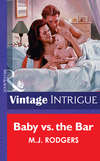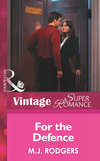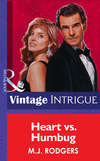Czytaj książkę: «Baby Vs. The Bar»
Baby vs. the Bar
M.J. Rodgers

I wish to thank Attorney Richard L. Peterson, from the law offices of Crawford, McGilliard, Peterson & Yelish, Port Orchard, Washington, for his expert advice. Any errors or stretching of legal procedures that may appear in this story are this author’s sole responsibility.
Richard Peterson doesn’t need to stretch the truth to see that justice is done.
For Elinor and John Paulk, the best neighbors anyone could have.

CAST OF CHARACTERS
Remy Westbrook—Her sperm-bank baby is turning out to be one in a billion.
Marc Truesdale—He’s an attorney defending an eighteen-month-old client.
Louie Demerchant—He isn’t overlooking any opportunity to get custody of his great-grandson.
Colin and Heddy Demerchant—They want custody of Remy’s son, too, but is it for love or money?
Gavin Yeagher—He’s the financial wizard who took a few measly millions and turned it into a billion-dollar fortune.
Norma Voyce—She seems more interested in plants than people.
Brian Pechman—He stands to lose a lot if Remy’s baby gets the money.
Steve Lyton—He’s Marc’s courtroom adversary, very high-powered, very high profile and very hard to beat.
Contents
Prologue
Chapter One
Chapter Two
Chapter Three
Chapter Four
Chapter Five
Chapter Six
Chapter Seven
Chapter Eight
Chapter Nine
Chapter Ten
Chapter Eleven
Chapter Twelve
Chapter Thirteen
Prologue
David Demerchant didn’t know his plane was diving directly into the sparkling silver waters of the Pacific Ocean.
A shaft of sudden, piercing light penetrated his closed eyelids, cracking them open, coaxing him back into consciousness. David squinted into the setting sun reflecting off the sea into the cockpit. He snapped to shocked attention, bolted upright and pulled back on the control wheel. The plane’s nose shot up, its engines singing from the sudden thrust that sent it soaring skyward.
David’s eyes became riveted on the climbing altimeter, his heart pounding in his ears as he realized he’d been a few hundred feet away from a watery grave.
Hot sweat broke out on his brow and under his arms. Icy sweat poured down his back. He continued to grip the controls until the plane had climbed to nine thousand feet. Only then did he ease the wheel forward to level off.
He swallowed the thick, cloying phlegm that had collected in his throat. He let out a relieved breath as his heartbeat began to slow to normal. That was close. Far too close.
The monotonous fatigue of the long, lonely flight had come on so gradually that he’d never realized he had been falling into a deep, deadly sleep. That was the first time he’d lost consciousness while at the controls. He was lucky it hadn’t been his last.
He glanced at his watch. Eleven hours had passed since he’d taken off from Seattle. Damn. He had overflown Honolulu, his first stop. He really had been asleep at the controls. He checked his magnetic compass and automatic direction finder. It was worse than he had thought. Looked like a strong southeast wind had taken him hundreds of miles north of his heading. Why hadn’t he noticed and compensated for the wind? Where had his mind been?
It would be too easy for him to drift off again into a sleep born of fatigue. He was going to have to put down soon and get some rest.
David verified his location on his aircraft position chart. He had already crossed the international date line. Great. Just great. Not a whole lot out here in the middle of the Pacific Ocean, except for the Midway Islands just to the southeast of him. And the only airstrip there was military.
Still, it had to be Midway. He had no choice. He folded his position chart and laid it on the empty passenger seat. He banked his plane into a slow left turn to take him southeast. The nose of his plane headed into the darkening sky. Only the droning engine and numbing fatigue surrounded him.
He reached into his pocket for his caffeine pills. They’d better help this time. He grasped his lucky gold flask lying on the passenger seat and unscrewed the top.
“A little tardy, but here’s to once again safely crossing the international date line and eluding King Neptune’s wrath,” he said, holding up the flask in formal salute.
David normally didn’t drink while flying, but ever since his first successful flight over the Pacific, the wine toast had become a tradition every time he crossed the international date line. He meant to keep it—and his luck— going.
For David knew that when a pilot was all alone in the air and over an ocean, he needed all the luck he could get, regardless of his competence or the plane’s safety.
He downed the caffeine pill along with a small swig of sparkling wine from the flask. But instead of refreshing his throat, this time the wine left a bitter taste in his mouth.
David recapped the flask and put it aside.
He didn’t want to make this trip to Guam. He’d been left with no choice. He must know. Everything.
He sat up straight and did rigorous isometric exercises, determined to remain vigilant. His face began to feel warm. From the exercise?
The seconds on the control panel clock marked their passing with a loud clicking in his ears. Or were those minutes that were ticking past so quickly?
His limbs were beginning to feel like mush, his thoughts limp and soggy. Damn, when was that caffeine going to kick in?
He shook his head as though to shake back his proper time sense and disperse the growing fuzziness in his brain.
He gripped the wheel, flexing his hand and arm muscles, and tried to focus on his upcoming radio call. Midway was not going to be happy to get a call from a private pilot way off his course, requesting to land because of fatigue.
David’s face felt so hot, his eyelids were so sore and heavy. He had a hard time sitting up straight. He grabbed the golden flask, unscrewed the top and dumped the remaining sparkling wine over his head.
The alcohol stung his eyes. He fought a sudden whirling white vortex encroaching on his peripheral vision.
Must keep my mind active. Must concentrate on the radio call to Midway. Damn, what do I tell them?
“You don’t have to tell them anything,” a brusque voice said from somewhere inside the cockpit.
David shot up in his seat as his eyes fixed on the owner of that voice. It was a six-inch-high, black-bearded, golden-crowned King Neptune, perched on the instrument panel, sprawled across a black anchor, grasping a silver trident in its right fist.
The hair at the back of David’s neck stood straight up. He shook his head, blinking hard. But the apparition didn’t go away. A part of David’s brain told him this tiny King Neptune wasn’t really there. But another part of his brain, the part that was seeing it, wasn’t so sure. His hands began to shake on the control wheel.
An eerie pink smile cracked the dark beard on King Neptune’s face. “Don’t worry. You’re not going to have to tell those military guys anything. You’ve already crashed, Davy boy. You’re in my domain now. Thirty fathoms deep and descending.”
A flash of icy alarm shot through the still-rational part of David’s brain.
Had he already crashed into the sea? Was he already dead? No! He must not listen! He must not believe!
His reflexes responded to the panic, switching into automatic. He set his transponder at 7700 and squawk indent. That would send a special code to let any monitoring controller know his position and that he was in trouble. He fumbled with the radio dial, trying to find the emergency frequency as the digits on the instrument panel swirled into the whirling white vortex swallowing his vision.
The tiny King Neptune rolled against the barnacled anchor in belly-shaking mirth, mocking David’s efforts, its laughter high and screechy, like static. David grabbed the radio mike. His eyes blurred, his throat burned, his words slurred, as he shoved them through his swollen lips.
“Mayday, Mayday—”
Chapter One
Attorney Marc Truesdale of Justice Inc. looked at the clogged downtown Seattle traffic in front of him, then at his watch, then at the driver of his taxi—all for the seventh time in the last seventy seconds.
Of all days for the monorail to be out of service.
“Isn’t there any way around this mess?” he asked.
“Nope,” his driver said. “You’re looking at the mayor’s downtown renovation project, pal. Pretty soon, all these streets are gonna be torn up. Relax. Lotsa people gonna be late this morning.”
“Not me,” Marc Truesdale said as he pushed open the passenger door.
“Hey, where you going?” the driver asked.
“The courthouse is seven blocks up. I’ll get there quicker by foot.” He threw the full fare onto the front seat and slammed the taxi door behind him.
Marc took off. Runners on the streets of Seattle were not an uncommon sight. But as a rush-hour jogger in a three-piece suit and carrying a briefcase, he got quite a few stares. He ignored the men and smiled at the women. As usual, he got plenty of smiles back.
When he reached the courthouse, he found a floor full of hopefuls waiting for the elevators. He checked his watch. Three minutes to ten. He headed without hesitation for the staircase.
No sooner had the door slammed behind him than he heard the rapidly ascending feet two flights above. Marc’s competitive spirit had him immediately picking up the pace. But the owner of that other pair of feet must have heard him, because their speed increased, too.
Marc smiled. So he wanted to race, did he?
Marc’s long legs skipped every other step in powerful lunges upward. He figured he’d overtake this guy by the next flight. But by the next flight, Marc could still clearly hear the fall of feet on the stairs above him.
Marc increased his already considerable speed, now skipping every two steps in giant lunges, eager to meet the man who could give him such stiff competition. Still, it was a full flight later before he finally closed in on his quarry. And when he did, he couldn’t believe his eyes.
Above him flashed long, shapely feminine legs in luscious black nylons beneath a rustling brown silk dress.
The shock of his discovery threw Marc momentarily off-balance, causing him to misstep. He grabbed the banister and saved himself from a fall. But by the time he had reclaimed his footing and looked up again, he could neither see nor hear the lady with the lovely legs.
Marc lunged up the last staircase and stopped at the landing, listening intently over his labored breath. No footfall resounded on the staircase above. A ladies’ room was on his right; the door to the left led off the stairwell into the courtrooms. Which way did she go?
He snatched open the door to the courthouse floor and searched up and down. The dress and legs were nowhere to be seen. She had to have gone into the ladies’ room.
Should he wait to see the face that went with those fabuous legs? He checked his watch. He had exactly forty-five seconds to make it to court.
“Oh, what the hell,” he muttered beneath his breath as he tore off toward his courtroom. “Probably wouldn’t have been worth it, anyway.”
His client, Louie Demerchant, met him just outside, looking slightly peeved. “I thought you were going to be late.”
“Never,” Marc said, running a quick hand through his thick blond hair to set it obediently back into place. “We’ve waited a long time for this, Mr. Demerchant. Let’s go inside.”
Marc could feel the tension in the packed courtroom minutes later as the tall, thin Stanley Binick slithered up to the witness stand.
“Tear him apart, Truesdale,” Louie Demerchant whispered angrily into Marc’s ear as they sat together at the plaintiff’s table.
Marc nodded, understanding his client’s feelings. This well-publicized suit they had brought against Binick had more to do with revenge than money. What’s more, Marc was happy to be a part of that revenge.
A couple of hundred years ago, Marc would have been acting as second to Louie Demerchant as Demerchant and Binick drew pistols and aimed for each other’s hearts. Today, Marc acted as Louie Demerchant’s lawyer.
Time had changed the mode, but not the emotion. Wounded human hearts cried out for justice in their pain. And justice was Marc Truesdale’s business.
Marc studied Binick as the clerk swore him in. He had gotten to know the man and his attorney, Quon Sato, over the two long years it took to get this case to trial. He respected the dark, compact Sato, who had a quiet manner and considerable knowledge of the law. But whenever the shifty, skin-shedding Binick was around, Marc instinctively kept checking to be sure his wallet was still in his pocket and his watch on his wrist.
Binick had refused to settle. Sato had consistently and competently stalled with every legal trick imaginable. Marc had countered them, overcome them. Now the defense attorney could stall no longer. Finally, Binick was in Marc’s sight.
Marc got to his feet and moved as close as permitted to the witness box. He kept his tone pleasantly neutral. That was how one dispatched an offender in these more civilized times, with indisputable facts and irrefutable logic—a bloodless separation of the incompetent from his professional reputation and financial resources.
A lot of these incompetents, Marc knew, would have preferred the quick bullet to the heart.
“Please state your name and occupation for the record.”
The man’s thin voice came out in a high rasp as he rubbed his sweaty hands together in jerky little movements. “Stanley Binick, president of Bio-Sperm.”
“Mr. Binick, would you please explain to this court what Bio-Sperm does?”
“Bio-Sperm collects human sperm, stores it and makes it available for artificial insemination.”
“Is your business commonly called a sperm bank?”
“Yes.”
“A moment ago you said you were the president of this sperm bank, but aren’t you also the sole owner of Bio-Sperm?”
“Yes.”
“You have no silent partners, no investors? You are totally in control of this private company?”
“Yes.”
“What did you gross last year?”
“Your honor, I object. Irrelevant,” Sato interjected.
The judge turned to Marc. She was an older, gray-haired gal in her sixties. This was her last year before retiring from the bench. Marc had been up before her countless times. She was one of his favorite judges, because he knew he was one of her favorite lawyers. He sent her a small smile.
“Your Honor, this jury must be presented with a clear understanding of all aspects of Bio-Sperm, including its solvency. Only then can they fully appreciate the extent of the improprieties and damages done to my client, Louie Demerchant.”
“Objection overruled,” the judge said. “You may answer the question, Mr. Binick.”
He may, yes, but he was clearly hesitant to do so. He sank lower in his chair as his raspy voice got fainter and his nervous tongue shot out to wet his lips. “A little more than four million.”
“Four million?” Marc said, repeating it loudly, letting his voice rise in surprise; although, of course, he’d already known the answer. A smart attorney had better know the answer to every question he asked of a witness sitting in front of a jury.
“You made four million in one year?”
Binick’s nervousness over the emphasized point caused his eyes to squint as he rubbed his tiny scale of a nose. “Gross, of course. And I work hard for that money. My rules are very stringent for donors. I accept applications only from college graduates. I personally do the interviews to make sure we get good-looking men.”
“So your hard work is to pick out good-looking men?”
“Well, partly...yes.”
“How do you define good-looking?”
“Tall. Physically appealing. Certainly no short men or men with big noses or receding chins. Our clients definitely wouldn’t want to have such a man’s child.”
Marc smiled to himself as he caught the dark looks erupting on the faces of the jury, a group of the shortest men with the biggest noses and most receding chins he had been able to find. So far, this testimony was going exactly as planned.
Binick’s eyes darted to the jury’s expressions, too. Realizing his mistake too late, he sank farther into the witness chair. Marc planned for him to be so low in the witness stand by the time he got through with him that the bailiff would have to get a spatula to flip him out of it.
“Mr. Binick, what procedures do you employ in collecting and storing this sperm?”
“The prospective donor men fill out a comprehensive questionnaire, and then we give them a cup and send them to the cupping room with a Playboy magazine or a videotape and—”
Marc held up his hand to interrupt. “You don’t have to go into that much detail.”
Marc guffawed along with the members of this all-male jury, purposely reminding them that despite the formality of his custom-made suit, beneath it he was just one of the boys.
“Now, Mr. Binick, after the sperm is collected, what do you do with it?”
“The sperm is frozen in liquid nitrogen at approximately three hundred degrees below zero Fahrenheit. It can last for ten years that way.”
“Who receives this preserved sperm?”
“Most of our clients are women married to infertile men. We provide healthy, anonymous donor sperm from men who approximate their husband’s size and coloring in order that they may conceive a child who will resemble them both.”
“Is providing anonymous sperm for women the only service you perform at Bio-Sperm?”
“No. We also store sperm from specific men who don’t wish to start a family right away, but want their sperm to be safeguarded for later use.”
“Why would a man wish to safeguard his sperm—for later use—as you term it?”
“Any number of reasons. An example would be men whose current medical problems require a procedure like chemotherapy that could render them infertile. They are looking for insurance.”
“So you store their sperm in order to ‘insure’ that these men will have the ability to pass on their genes in the future should they so desire?”
“Yes.”
“Mr. Binick, did a man by the name of David Demerchant come to you to avail himself of your sperm bank ‘insurance’ services?”
“Yes.”
“When?”
“November and December, three years ago.”
“And what was his reason?”
“David Demerchant’s family carries a genetic predisposition to become sterile by the age of thirty. Both his grandfather, Louie Demerchant, and his father, Colin Demer- chant, had suffered this fate. David wanted his sperm saved in the event that he became infertile before he could have a family.”
“How old was David at the time he visited your sperm bank?”
“Twenty-eight.”
“Were you aware that David was the only child of his father and the only grandchild of Louie Demerchant, the prominent industrialist?”
“Yes.”
“You knew that David was the last of the Demerchant line?”
“Yes.”
“You knew how important it was to safeguard his sperm?”
“Yes.”
“How did you know these things?”
“When Louie Demerchant called to make the appointment for his grandson, he explained the circumstances.”
“He mentioned them in passing?”
“No. He talked about them at length and in detail to be sure I understood the seriousness of the matter.”
“Did you understand the seriousness of the matter?”
“Of course. I said as much many times to Mr. Demerchant. Still, Louie Demerchant was adamant about making all the arrangements and paying the annual storage fee himself to be sure everything was seen to properly. That’s where all the confusion began, you see. If—”
“Mr. Binick, please just answer my questions without any added comments. The jury needs to hear what happened in an orderly manner. Do you understand?”
“Yes.”
“Mr. Binick, do you know what happened to David Demerchant after he entrusted his sperm to your company?”
“David Demerchant was killed in a plane crash over the Pacific Ocean in June, two years and three months ago.”
Marc let a small space of time pass—like a solemn moment of mourning—before asking his next question.
“He died six months after he deposited his sperm with Bio-Sperm for safekeeping, isn’t that right?”
“Yes.”
“Did Louie Demerchant approach you regarding his grandson’s sperm shortly after his grandson’s death?”
“Yes. Within two weeks he had found a woman who had agreed to be inseminated with his grandson’s sperm and give birth to David’s child.”
“And when Mr. Demerchant brought in this woman for artificial insemination, what happened?”
Binick’s tongue slithered over his lips. “We couldn’t locate David Demerchant’s sperm tube.”
“You lost this sperm you were supposed to be safeguarding?”
“I’ve been in business for more than ten years without a mistake. I’ve set up a very specific procedure. I have a double-numbering system. Color-coded tubes. Cross-system checks.”
“But you still lost David Demerchant’s sperm, yes or no?”
Binick sank farther into the chair. “Yes.”
“Mr. Binick, what did you tell your lab technician to do when you discovered you had lost David’s sperm?”
“I wasn’t serious.”
“Mr. Binick, please answer the question. What did you tell your lab technician to do?”
“I said something about substituting anonymous donor sperm in place of David’s lost sperm. But it was only a joke! I didn’t know she’d take me seriously.”
“Only a joke? Mr. Binick, didn’t you in fact order your lab technician to quickly find an anonymous donor sperm that could pass as David Demerchant’s?”
Binick’s tongue flicked between his thin lips. “She misunderstood me, I tell you. The woman has no sense of humor.”
“Mr. Binick, the surrogate mother was waiting in the receiving room. Louie Demerchant was outside in the waiting room. You had just found out you lost his grandson’s sperm, sperm that could never be replaced. And you felt this was an appropriate time for jokes?”
Binick slithered farther into his chair. “I made an error in judgment. I’m sorry. I meant no harm. I tell you, it was only a joke.”
He was so clearly lying. Marc could see it and he knew the jury could see it, too. He stared at his witness to allow the jury’s full loathing to come to a boil before going on.
“After you made this joke to the lab technician to substitute other sperm for David Demerchant’s, what did the lab technician do?”
“She went into the waiting room and told Louie Demerchant we had lost his grandson’s sperm and that I had told her to substitute someone else’s sperm.”
“So you didn’t get away with your scheme to pass off someone else’s child as Louie Demerchant’s grandchild, did you?”
“There was no scheme! I tell you, it was all an unfortunate misunderstanding!”
“Mr. Binick, did you ever find out what happened to David Demerchant’s missing sperm?”
“Yes, it had been destroyed.”
“You destroyed David’s sperm?”
“Not me, one of my employees!” Binick’s raspy voice protested, a thin line of sweat breaking out on his brow.
Typical Binick. Trying to put the blame on anyone and everyone but himself.
“Mr. Binick, would you please explain to this court how your company destroyed the sperm David Demerchant had entrusted to you for safekeeping?”
Binick’s visibly sweaty hands rubbed the chair’s upholstered arms. “Our computer form has just one space for a client’s name.”
“And what is the significance of your computer form having just one space for a client’s name?”
“Louie Demerchant’s name went on the computer records for sperm preservation instead of David’s, because it was Louie who called to set up the appointments and insisted on paying for the sperm’s storage. He never should have done that!”
“Mr. Binick, are you trying to tell this court that it was Louie Demerchant’s fault that you destroyed his grandson’s sperm because he emphasized the importance of preserving it and paid you to do so?”
Binick sank some more in the witness chair. “No, I...no.”
“So what happened when David Demerchant later came in and left his sperm deposits for safekeeping, his insurance against an unforeseen future?”
“David Demerchant entered his name on our questionnaire along with his background statistics. The technician ran a computer search. When he found nothing under David Demerchant’s name, he set up a new computer file, number-coded his sperm for confidentiality and placed David Demerchant’s sperm in the donor pool storage receptacle.”
“The donor pool? It was doled out?”
“It wasn’t my mistake!”
“All this happened because there weren’t separate lines on the computer form for payee’s name and donor’s name, is that right?”
“Yes.”
“And who made this determination that there should only be one line and not two?”
By now, Binick’s long scaly face was shiny with his nervous perspiration. He drew out a tissue from his pocket and started blotting. “It would have cost more money to have added another line.”
“So it was your decision to pinch pennies instead of providing adequate space on your computer form?”
“I object to that unfair characterization, Your Honor,” Sato said.
“Sustained,” the judge ruled. “No editorials, counselor.”
“I’ll rephrase,” Marc responded. “Mr. Binick, was it your decision to restrict space on your computer form, an action that caused David Demerchant’s sperm to be doled out to your clients instead of preserved?”
“We didn’t just dole it out! We kept track of who got whose sperm and how well the sperm did. When none of the first six women we inseminated with David Demerchant’s sperm conceived, we rechecked it and found that its motility was impaired so it was withdrawn from donor status.”
“Let’s take this one step at a time, Mr. Binick. Did you or did you not make the decision about the space on the computer form?”
“I—”
“Yes or no, Mr. Binick.”
Binick sank even more in his chair, looking like he wished he could slither beneath it. “Yes.”
“Now, would you please explain to this jury in common, everyday language what you mean by the motility of David’s sperm being impaired?”
“In order for sperm to fertilize an egg they have to be vigorous swimmers. When one of our lab technicians checked David Demerchant’s sperm, she found they were lazy and did not meet the high standards we uphold at Bio-Sperm.”
“Are you trying to tell this court that David Demerchant’s sperm could not have produced a child?”
“His sperm were mobile enough for conception, given time. It’s just that our clients pay for each insemination attempt, and they become impatient when nothing is immediately forthcoming. So we try to provide them with only very vigorous sperm to speed up their becoming pregnant. Which is why when we discovered the motility problem, we removed David Demerchant’s storage tubes from the donor storage receptacle.”
“You mean you destroyed his sperm,” Marc repeated for emphasis.
“Yes.”
“You destroyed David Demerchant’s sperm, sperm you were supposed to be holding for him to insure his progeny?”
“I—”
“Yes or no, Mr. Binick?”
Binick’s eyes flitted to the jury, then back to Marc. His tongue darted out nervously. “Yes.”
“You are responsible for destroying sperm that you knew was supremely important to preserve, because it was the only hope for the Demerchant line, yes or no?”
“Yes.”
“And by destroying that sperm, you have destroyed Louie Demerchant’s dream of having a great-grandchild through the surrogate mother of his choice, haven’t you, yes or no?”
“Yes.”
“Mr. Binick, because of your mistake, you have literally doomed the distinguished Demerchant family line to extinction, haven’t you, yes or no?”
“Well...no.”
“No?” Marc repeated, barely able to believe his ears. “Mr. Binick, did you or did you not just admit that Bio-Sperm destroyed David Demerchant’s sperm?”
“Well, yes, but—”
“But, nothing. It was the only chance that the Demerchant line had of continuing. Now there’ll never be a child to carry on the Demerchant name. Isn’t that true?”
“Well, none to carry on the name, perhaps. But—”
“Perhaps? Mr. Binick, when I took your deposition two months ago, you said none of those six women conceived from David’s sperm. Are you trying to say now that one of them did?”
“Oh, no. None of those women conceived. That’s why the lab technician tested the sperm, destroyed it and inactivated David’s computer file, as I said. That’s also the reason why it wasn’t until last week, when we were updating and cross-checking our files, that we found her, you see.”
“Found her. Found who?”
“I have a computer printout of her record right here,” Binick said, his sweaty hands diving into his pocket, dragging out a piece of folded paper that he subsequently shoved at Marc. “See?”
Marc took the paper, unfolded it and quickly perused its contents. “All I see is a bunch of computer codes, Mr. Binick. What is this supposed to mean?”
“It’s all the details about the seventh client. She didn’t get on David’s computer file because at the same time the recipient was receiving David’s sperm, another lab technician was testing David’s sperm, ordering it destroyed, and inactivating his file. That’s also why the positive take wasn’t subsequently recorded.”
“Positive take? Mr. Binick, are you saying this seventh woman received David Demerchant’s sperm and conceived?”
Binick rubbed his tiny scale of a nose as his thin, pushed-out face spread into its first smile. “She not only conceived, Mr. Truesdale, she gave birth to David Demerchant’s baby nine months later.”
Darmowy fragment się skończył.















